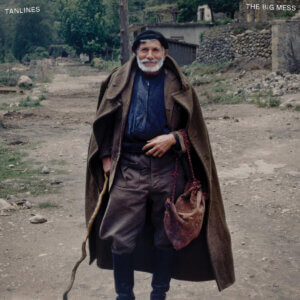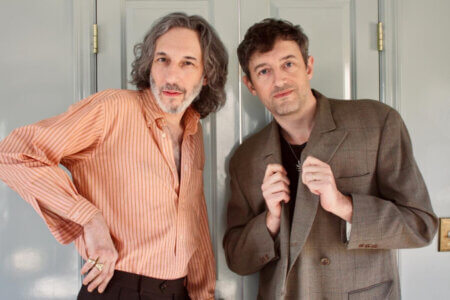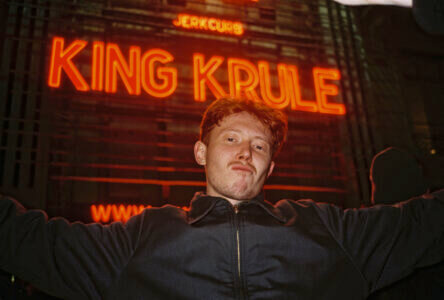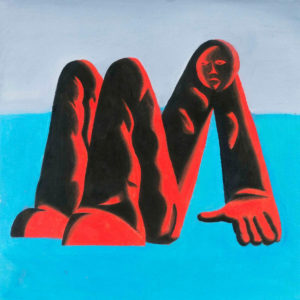Our interview with Jesse Cohen from Tanlines
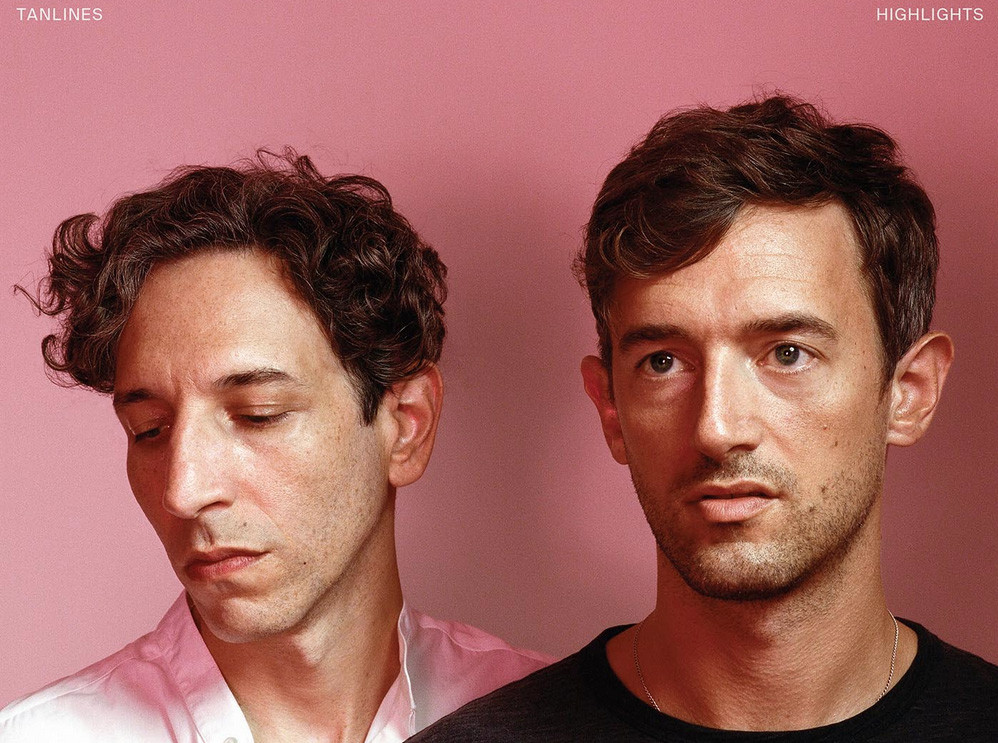
Tanlines are known equally for their innovative wit as they are for their beechy keen tunes. This has been both a boon and a crutch for the band, as their penchant for humor in their promotional tactics has surely drawn them more attention, but has sometimes distracted from their primary function. For their second album Highlights, they set up a Netflix-style parody for their main website, allowed a first listen of the record via a conference call, and had the record’s first music video (for opening ballad “Pieces”) be depicted as a Funny or Die basketball underdog story starring its two members, Eric Emm and Jesse Cohen.
While Emm is the mouthpiece of the band musically as their lead singer, Cohen often times acts as the band’s voice for interviews (or at least he has in the two times I’ve spoken with him). When we met in the Brooklyn coffee shop Primrose, his demeanor is what I came to expect from our phone conversation three years ago for the release of their first album, Mixed Emotions — straightforward and through, but above all, serious. Throughout our 40 minute conversation, he rarely smiles. His demeanor was not dour, merely focused. At one point, he paused to formulate his response, asking if this would be a long form feature, or a Q&A (a smart move that none of my previous subjects have thought to ask). As a writer, getting to talk seriously about music is important to me, especially in this case, being that Tanlines are starting to become one of this decade’s underestimated groups. They are enjoyed, but not massively lauded. Cohen knows this, and is not at all bitter about it. As he puts it, Tanlines belong to a new middle class of indie, one that doesn’t rely on critical praise for a leg up. If he were to state a gripe, it would merely be for the sake of letting the music speak for itself, something that Tanlines songs have always done very well. “I don’t really care what reviews say,” says Cohen. “Everyone’s doing their job. [But] there is one kind of review where they’re like, ‘This is bad because I wanted a different album from them.’…That’s not really fair. I’m not complaining, but that’s the one kind of review where it’s about you, and you’re comparing what you’re hearing to what you imagined we are.”
The fact is, there is plenty to love on Highlights. Co-produced by Grizzly Bear’s Chris Taylor and old friend Patrick Ford, it builds on the band’s refreshing spirit with a combined new sense of maturity. In our interview, we talk about how Chris Taylor brought out the band’s inner guitar, avoiding the Travis Bark-effect in a four-piece live set up, and the band’s jovial disposition in evading the haters.
Northern Transmissions: The last time we spoke was over three years ago when you were readying Mixed Emotions’ release. Is there any particular reason it took a little longer than one would have expected?
Jesse Cohen: I think that’s less true now than it was then, in terms of how long it is for albums to come out. I think it’s becoming more common to take longer between albums, especially because, and I think this is the reason that it took us a while, we were touring the last album for almost two years after it came out. We did Coachella in April of 2014, which was two years after the release of the album. That would be the main reason. I mean it was just a long cycle and we’re not really good at writing while also touring. When we toured, we never had a tour manager, we do a lot of it ourselves so I would say that put us back at about a year.
NT: So you feel like you need to be in a real writing space.
JC: I think yeah. It’s hard for us to do both at the same time.
NT: In your press release there’s this infamous story of your computer blowing up when you first began to work on new material.
JC: Yeah, that actually was before Coachella. That was the one time we started to work on stuff while still touring. We took a week and went to Pittsburgh. That was right after setting up. But setting up took us a long time too. I guess we’re slow. In so many ways we are and so many ways we aren’t.
NT: Well after the computer malfunctioned, you guys started recording very simply — just guitar and drums. Did that affect the way you crafted the songs?
JC: We were just using a very bare bones version of Logic to track the few mics that we had. So we didn’t have a lot of our synths and effects. It was a barebones version of our normal writing set up to just track guitar, drums and vocals.
NT: What songs were started during that period?
JC: The only one that’s on the album is “Invisible Ways.” There’s a bunch of other stuff that never got finished, but that’s how we write. We always write a lot and then finish a little bit.
NT: Where was the next session?
JC: After that we went back to our old studio. The whole process was like a ping pong between our more traditional recording [and newer ways of recording]. We did Pittsburgh, and then Eric’s studio, and then we went to L.A.
NT: And that was with [producer] Patrick Ford?
JC: Yeah. He’s been involved in like everything. He has some production credit on the first record…he was engineering a lot of it for us and he does live sound. He’s sort of our third person. And then he moved to L.A. and has a little studio there. So we did two week-long sessions out there. Then we also did a session at Tree Fort Studio in Brooklyn and Patrick came out and recorded us there.
NT: Okay, so then when did you start working with Chris Taylor?
JC: Chris came on board in April of 2014. We worked with him for maybe a month. Even after that, we still went back to work with Patrick to finish a couple of the songs, and then we mixed it back in November.
NT: Were there any ideas that you wanted to explore on this album that you didn’t have back when you were working on Mixed Emotions?
JC: The whole thing that we always talk about, is elevating our process. The only thing we knew when we started the album was that we wanted a color photo of ourselves on the front. That meant working outside of our [usual set up]. We didn’t want to make the whole album in our home studio. We wanted to work with a producer at one point. We wanted to record in cool places. And those cool places ended up being Eric’s parents’ basement and L.A., and the church. That was it really, just to do what we do but in new ways.
NT: Did you feel that there was anything tangible that you could pinpoint as to what you got out of these places? Working with Chris for instance — what do you think he brought to the table that would have changed this from being what you usually would have done?
JC: I’d say the biggest thing by far is the sound of the album. Not necessarily from a technical perspective, but if you just sort of listen to them side by side, the new album sounds richer, fuller, just more organic sounding. I listen to the old album and it sounds like it’s coming straight out of the computer. And it sounds good but it also sounds a little half-produced. Maybe that’s part of what’s good about it, I don’t know. I’d say the greatest thing that Chris brought was a third opinion, because we really needed it at that time. And the other was just the sound, and a lot of that just comes from working in the church with him. But it also comes from — He’s pretty old school. He’s a very ‘set up the mics and record’ type guy. But then of course when we mixed the album, we went with the guy who is totally in the box, modern mixing style [Rob Kinelski]. He mixes a lot of hip-hop records like Big Sean and Azealia Banks, so he’s a very modern kind of mixer.
NT: There’s certainly guitars on the first record, but they feel more prominent than ever here.
JC: Absolutely, and a lot of that happened with Chris. He wanted to add guitar to like everything. And so a lot of guitars came out at that point.
NT: Even you’re credited as playing guitar here.
JC: I think I play one thing. I think it was the melody in the chorus on “Palace.” I played it like I would a synthesizer — I don’t really know how to play guitar. I’m playing bass now in the live band also.
NT: What is the live set up like now?
JC: It used to just be the two of us, so now we have another guitar player and a drummer.
NT: Do you have any TV performances scheduled?
JC: Not that I know of. Hopefully. The last time we did one…
NT: Right, on Jimmy Fallon.
JC: RIght, and it came almost a year after the album came out. I don’t know how that works. I would love to do it, because I want to bring the band out.
NT: I’d love to hear what they’re doing with the older material too.
JC: It’s good. It was a hard decision for us because it was very tempting to just remain a two-piece, and it’s logistically way easier. When we started this band, every label and managerial-type schmo is like, “You need a drummer!” Everyone always says that. So we’ve always been like, “You don’t know anything.” I was very proud that we were successful without adding a drummer, so it was a hard decision. It was a decision between adding a lot of production, like having a cool light show, or some shit like that, or just adding more players. And if you look at me and Eric — we’re just not light show production type dudes. We’re not EDM or Disclosure, so it felt very true-to-us decision, to make it a band. Eric and I were were very sensitive about it — One of my least favorite live band things is like when you have a rapper and Travis Barker playing drums — that’s how I would describe it. Like when Jay Z is on some show or does a big festival, and he’ll get like Travis Barker and he’s playing super hard and hitting all the crashes…I would just rather hear Jay Z with an iPod. I didn’t want that effect on our music. But the guys we’ve been playing with get it.
NT: I’m sorry to say that I haven’t seen Tanlines live ever, actually.
JC: Oh, okay….we’re amazing.
NT: So I’ve heard! Okay, so I want to talk about reviews. This record was reviewed well by this publication. Rolling Stone also liked it a lot, as did a few others. On the whole though, the reviews for Highlights have been a little mixed.
JC: It has. I’m not [surprised].
NT: Why is that?
JC: Speaking for myself, because I don’t think Eric has even read any of the reviews. One thing we knew [with] this band…I don’t think our last album was particularly critically acclaimed.
NT: There wasn’t anything huge, but I don’t recall anything negative.
JC: The only negative things we got were from the British press. They destroyed us. They hated us. Here, it was like a Meh-plus. It was like a 7-ish. And this one is like a Meh-minus. But we never felt that any of the success we had from the last album came from critics. We wern’t on Best-End lists, and our fans were never music critic types, to be honest. We haven’t been expecting anything like that this time around either. So we’ve been more focused on how to reach fans and how to reach people. I would say it’s kind of what I expected. I would say my general feeling about reviews and critics is — I have a podcast, so I have my own media thing where I talk to people — and I’m definitely not a critic and I would never want to be. My general feeling about reviews is that good reviews can help you more than bad reviews can hurt you. So if you get a good review, it will push your music and your band into a lot of new spaces.
NT: Sure, I mean I feel like it’s bonus points. A scathing review might hurt, but a lack of high praise won’t bring a record down.
JC: Critics are definitely not pushing this album into new spaces for us. That’s what I mean. I don’t know how many people read about music in general, with all due respect. I think if you compare the number of people who listen to music and love music, to the number of people who read about music, it would be like a mountain next to a molehill…Anything that will help us, we’ll try to get, and if it’s not critical success, that it will be something else. I’m not really sure what that is but we’re trying and we’re doing the best thing that we can.
Interview by Doug Bleggi
Latest Reviews
Trending
Tracks
Advertisement
Looking for something new to listen to?
Sign up to our all-new newsletter for top-notch reviews, news, videos and playlists.





